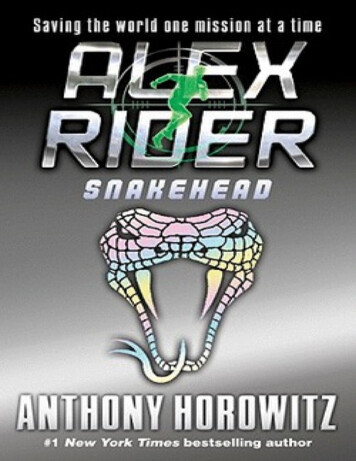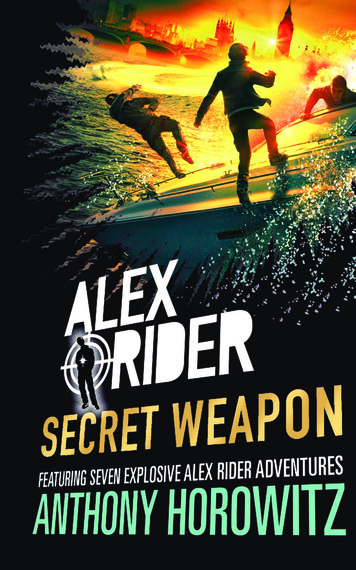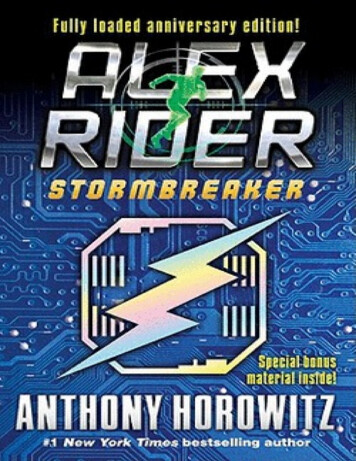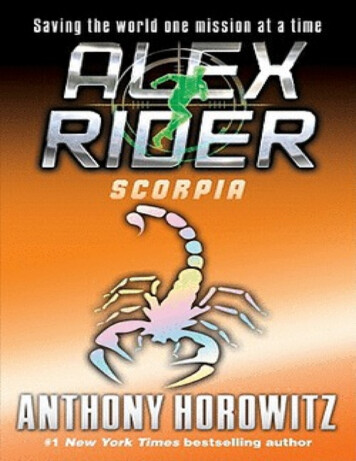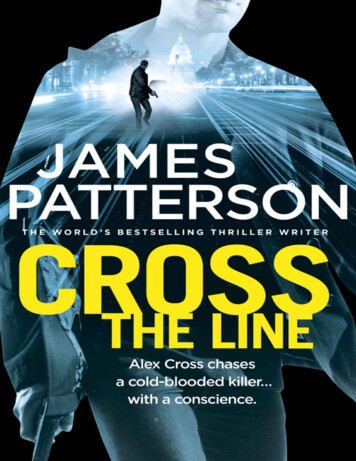
Transcription
CONTENTSAbout the BookAbout the AuthorAlso by James PattersonPraiseTitle PagePrologueOneTwoPart One: A COP KILLINGChapter 1Chapter 2Chapter 3Chapter 4Chapter 5Chapter 6Chapter 7Chapter 8Chapter 9Chapter 10Chapter 11Chapter 12Part Two: A VIGILANTE KILLINGChapter 13Chapter 14Chapter 15Chapter 16Chapter 17Chapter 18Chapter 19Chapter 20Chapter 21Chapter 22Chapter 23Chapter 24Chapter 25Chapter 26Chapter 27Chapter 28
Chapter 29Chapter 30Chapter 31Chapter 32Chapter 33Chapter 34Chapter 35Part Three: MERCURY RISINGChapter 36Chapter 37Chapter 38Chapter 39Chapter 40Chapter 41Chapter 42Chapter 43Chapter 44Chapter 45Chapter 46Chapter 47Chapter 48Chapter 49Chapter 50Chapter 51Chapter 52Chapter 53Chapter 54Chapter 55Chapter 56Chapter 57Chapter 58Chapter 59Chapter 60Chapter 61Chapter 62Chapter 63Chapter 64Chapter 65Part Four: THE REGULATORSChapter 66Chapter 67Chapter 68Chapter 69
Chapter 70Chapter 71Chapter 72Chapter 73Chapter 74Chapter 75Chapter 76Chapter 77Chapter 78Chapter 79Chapter 80Chapter 81Chapter 82Chapter 83Chapter 84Chapter 85Chapter 86Part Five: A BLIMP RUNNETHChapter 87Chapter 88Chapter 89Chapter 90Chapter 91Chapter 92Chapter 93Chapter 94Chapter 95Chapter 96Chapter 97Chapter 98Chapter 99Chapter 100Chapter 101Chapter 102Chapter 103Chapter 104Chapter 105Extract from Cross KillCopyright
ABOUT THE BOOKSHOTS RING OUT IN THE EARLY MORNING HOURS IN THE SUBURBS OFWASHINGTON, D.C.WHEN THE SMOKE CLEARS, A HIGH-RANKING COP LIES DEAD.Under pressure from the mayor, Alex Cross steps into the leadership vacuum to investigate theaudacious killing. But before Cross can make any headway, a wave of murders erupts across the city.The victims have one thing in common – they are all criminals.And the only thing more dangerous than a murderer without a conscience is a killer who thinks he hasjustice on his side.
ABOUT THE AUTHORJAMES PATTERSON is one of the best-known and biggest-selling writers of all time. His bookshave sold in excess of 325 million copies worldwide and he has been the most borrowed author inUK libraries for the past nine years in a row. He is the author of some of the most popular series ofthe past two decades – the Alex Cross, Women’s Murder Club, Detective Michael Bennett andPrivate novels – and he has written many other number one bestsellers including romance novels andstand-alone thrillers.James is passionate about encouraging children to read. Inspired by his own son who was a reluctantreader, he also writes a range of books for young readers including the Middle School, I Funny,Treasure Hunters, House of Robots, Confessions and Maximum Ride series. James is the proudsponsor of the World Book Day Award and has donated millions in grants to independent bookshops.He lives in Florida with his wife and son.Find out more at www.jamespatterson.co.ukBecome a fan of James Patterson on Facebook
Also by James PattersonHave You Read Them All?ALONG CAME A SPIDERAlex Cross is working on the high-profile disappearance of two rich kids. But is he facingsomeone much more dangerous than a callous kidnapper?KISS THE GIRLSCross comes home to discover his niece Naomi is missing. And she’s not the only one.Finding the kidnapper won’t be easy, especially if he’s not working alone JACK AND JILLA pair of ice-cold killers are picking off Washington’s rich and famous. And they have theultimate target within their sights.CAT AND MOUSEAn old enemy is back and wants revenge. Will Alex Cross escape unharmed, or will this bethe final showdown?POP GOES THE WEASELAlex Cross faces his most fearsome opponent yet. He calls himself Death. And there arethree other ‘Horsemen’ who compete in his twisted game.ROSES ARE REDAfter a series of fatal bank robberies, Cross must take the ultimate risk when faced with acriminal known as the Mastermind.VIOLETS ARE BLUEAs Alex Cross edges ever closer to the awful truth about the Mastermind, he comesdangerously close to defeat.FOUR BLIND MICEPreparing to resign from the Washington police force, Alex Cross is looking forward to apeaceful life. But he can’t stay away for long THE BIG BAD WOLFThere is a mysterious new mobster in organised crime.The FBI are stumped. Luckily for them, they now have Alex Cross on their team.
LONDON BRIDGESThe stakes have never been higher as Cross pursues two old enemies in an explosiveworldwide chase.MARY, MARYHollywood’s A-list are being violently killed, one-by-one. Only Alex Cross can put togetherthe clues of this twisted case.CROSSHaunted by the murder of his wife thirteen years ago, Cross will stop at nothing to finallyavenge her death.DOUBLE CROSSAlex Cross is starting to settle down – until he encounters a maniac killer who likes anaudience.CROSS COUNTRYWhen an old friend becomes the latest victim of the Tiger, Cross journeys to Africa to stopa terrifying and dangerous warlord.ALEX CROSS’S TRIAL(with Richard DiLallo)In a family story recounted here by Alex Cross, his great-uncle Abraham faces persecution,murder and conspiracy in the era of the Ku Klux Klan.I, ALEX CROSSInvestigating the violent murder of his niece Caroline, Alex Cross discovers an unimaginablesecret that could rock the entire world.CROSS FIREAlex Cross is planning his wedding to Bree, but his nemesis returns to exact revenge.KILL ALEX CROSSThe President’s children have been kidnapped, and DC is hit by a terrorist attack. Crossmust make a desperate decision that goes against everything he believes in.MERRY CHRISTMAS, ALEX CROSSRobbery, hostages, terrorism – will Alex Cross make it home in time for Christmas alive?ALEX CROSS, RUNWith his personal life in turmoil, Alex Cross can’t afford to let his guard down. Especiallywith three bloodthirsty killers on the rampage.
CROSS MY HEARTWhen a dangerous enemy targets Cross and his family, Alex finds himself playing a wholenew game of life and death.HOPE TO DIECross’s family are missing, presumed dead. But Alex Cross will not give up hope. In a raceagainst time, he must find his wife, children and grandmother – no matter what it takes.CROSS JUSTICEReturning to his North Carolina hometown for the first time in over three decades, Crossunearths a family secret that forces him to question everything he’s ever known.A list of more titles by James Pattersonis printed at the back of this book
Why everyone lovesJames Patterson and Alex Cross‘It’s no mystery why James Patterson is the world’s mostpopular thriller writer. Simply put: nobody does it better.’Jeffery Deaver‘No one gets this big without amazing naturalstorytelling talent – which is what Jim has,in spades. The Alex Cross series proves it.’Lee Child‘James Patterson is the gold standardby which all others are judged.’Steve Berry‘Alex Cross is one of thebest-written heroes in American fiction.’Lisa Scottoline‘Twenty years after the first Alex Cross story, he hasbecome one of the greatest fictional detectivesof all time, a character for the ages.’Douglas Preston & Lincoln Child‘Alex Cross is a legend.’Harlan Coben‘Patterson boils a scene down to the single, telling detail,the element that defines a character or moves a plot along.It’s what fires off the movie projector in the reader’s mind.’Michael Connelly‘James Patterson is The Boss. End of.’Ian Rankin
PrologueA DEATH ON ROCK CREEK
ONEHE CHANGED IDENTITYlike many warriors do before battle. He called himself Mercury on nights likethese.Dressed in black from his visor helmet to his steel-toe boots, Mercury had his motorcycle backedup into a huge rhododendron bush by the Rock Creek Parkway south of Calvert Street. He sat astridethe idling bike and cradled a U.S. Army surplus light detection and ranging device. He trained thelidar on every vehicle that went past him, checking its speed.Forty-five miles an hour, on the money. Forty-four. Fifty-two. Routine stuff. Safe numbers. Boringnumbers.Mercury was hoping to see a more exotic and inflated figure on the screen. He had good reason tobelieve a bloated number like that would appear before this night was over. He was certainly in theright place for it.Built in the 1920s, Rock Creek Parkway had been designed to preserve the natural scenic beauty ofthe area. The winding four-lane road ran from the Lincoln Memorial north through parks, gardens, andwoods. It was 2.9 miles long and split in Northwest DC. Beach Drive, the right fork, headednortheast, deeper into the park. The parkway itself continued on to the left and curled back northwestto the intersection with Calvert Street.Forty-three miles an hour, according to the lidar display. Forty-seven. Forty-five.These numbers were not surprising. The parkway was on the National Register of Historic Placesand was maintained by the National Park Service; it had a set speed limit of forty-five miles an hour.But the parkway’s meandering route was about as close to a Grand Prix circuit as you could find inor around the District of Columbia. Elongated S curves, chicanes, a few altitude changes,straightaways that ran down the creek bottom—they were all there, and the road was almost twice thelength of the fabled Grand Prix course at Watkins Glen, New York.That alone makes it a target, Mercury thought. That alone says someone will try. If not tonight,then tomorrow, or the night after.He’d read an article in the Washington Post that said that on any given night, the odds were betterthan one in three that some rich kid or an older prick sucking big-time off the federal teat would bringout the new Porsche or the overhorsed BMW and take a crack at Rock Creek. So might the suburbankid who’d snuck out the old man’s Audi, or even a middle-aged mom or two.All sorts of people seemed obsessed by it. One try every three nights, Mercury thought. But tonight,the odds were even better than average.A few days ago, a budget crisis had closed the U.S. government. All funding for park lawenforcement had been frozen. No salaries were being paid. Park rangers had been sent home forliability reasons. There was no one looking but him.Hours went by. Traffic slowed to a trickle, and still Mercury aimed the lidar gun and shot, read theverdict, and waited. He was nodding off at a quarter to three that morning and thinking that he shouldpack it in when he heard the growl of a big-bore engine turning onto the parkway from Beach Drive.On that sound alone, Mercury’s right hand shot out and fired up the bike. His left hand aimed thelidar at the growl, which became a whining, buzzing wail of fury coming right at him.
The instant he had headlights, he hit the trigger.Seventy-two miles an hour.He tossed the lidar into the rhododendrons. He’d return for it later.The Maserati blew by him.Mercury twisted the accelerator and popped the clutch. He blasted out of the rhododendrons, flewoff the embankment, and landed with a smoking squeal in the parkway not a hundred yards behind theItalian sports car.
TWObrand-new, sleek, black; a Quattroporte, Mercury thought, judging by the glimpsehe had gotten of the car as it roared past him, and probably an S Q5.Mercury studied such exotic vehicles. A Maserati Quattro-porte S Q5 had a turbo-injected sixcylinder engine with a top speed of 176 miles per hour, and it boasted brilliant transmission,suspension, and steering systems.Overall, the Maserati was a worthy opponent, suited to the parkway’s challenges. The average manor woman might think a car like that would be impossible to best on such a demanding course,especially by a motorcycle.The average person would be wrong.Mercury’s bike was a flat-out runner of a beast that could hit 190 miles an hour and remain nimblethrough curves, corkscrews, and every other twist, turn, and terrain change a road might throw at you.Especially if you knew how to drive a high-speed motorcycle, and Mercury did. He had been drivingfast bikes his entire life and felt uniquely suited to bring this one up to speed.Eighty miles per hour; ninety. The Maserati’s brake lights flashed in front of him as the parkwaycame out of the big easterly curve. But the driver of the Italian sports car was not set up for thesecond turn of a lazy and backward S.Mercury pounced on the rookie mistake; he crouched low, gunned the bike, and came into thesecond curve on a high line, smoking-fast and smooth. When he exited the second curve, he was righton the Maserati’s back bumper and going seventy-plus.The parkway ran a fairly true course south for nearly a mile there, and the Italian sports car tried toout-accelerate Mercury on the straight. But the Maserati was no match for Mercury’s custom ride.He drafted right in behind the sports car, let go of the left handlebar, and grabbed the Remington1911 pistol Velcroed to the gas tank.Eighty-nine. Ninety.Ahead, the parkway took a hard, long left turn. The Maserati would have to brake. Mercurydecelerated, dropped back, and waited for it.The second the brake lights of the Italian sports car flashed, the motorcyclist hit the gas and made alightning-quick jagging move that brought him right up next to the Maserati’s passenger-side window.No passenger.Mercury got no more than a silhouette image of the driver before he fired at him twice. Thewindow shattered. The bullets hit hard.The Maserati swerved left, smacked the guardrail, and spun back toward the inside lane just asMercury’s bike shot ahead and out of harm’s way. He downshifted and braked, getting ready for thecoming left turn.In his side-view mirror, he watched the Maserati vault the rail, hit trees, and explode into fire.Mercury felt no mercy or pity for the driver.The sonofabitch should have known that speed kills.THE MASERATI WAS
Part OneA COP KILLING
CHAPTER1Aisle at Whole Foods, Tom McGrath was thinking that the long, lithewoman in the teal-colored leggings and matching warm-up jacket in front of him had the posture of aballerina.In her early thirties, with high cheekbones, almond-shaped eyes, and jet-black hair pulled back in aponytail, she was lovely to look at, exotic even. She seemed to sense his interest and glanced back athim.In a light Eastern European accent, she said, “You walk like old fart, Tom.”“I feel like one, Edita,” said McGrath, who was in his mid-forties and built like a wide receivergone slightly to seed. “I’m stiff and sore where I’ve never even thought of being stiff and sore.”“Too many years with the weights and no stretching,” Edita said, putting two bottles of kombuchatea in the cart McGrath was pushing.“I always stretch. Just not like that. Ever. And not at five in the morning. I felt like my head wasswelling up like a tick’s in some of those poses.”Edita stopped in front of the organic produce, started grabbing the makings of a salad, said, “Whatis this? Tick?”“You know, the little bug that gives you Lyme disease?”She snorted. “There was nothing about first yoga class you liked?”“I gotta admit, I loved being at the back of the room doing the cobra when all you fine yoga ladieswere up front doing downward dog,” McGrath said.Edita slapped him good-naturedly on the arm and said, “You did not.”“I got out of rhythm and found I kind of liked being out of sync.”She shook her head. “What is it with the men? After everything, still a mystery to me.”McGrath sobered. “On that note, any luck finding what I asked you about the other day?”Edita stiffened. “I told you this is not so easy, Tom.”“Just do it, and be done with them.”She didn’t look at him. “School? My car? My apartment?”“I said I’d help you.”Torn, Edita said, “They don’t give a shit, Tom. They—”“Don’t worry. You’ve got the warrior McGrath on your side.”“You are hopeless,” she said, softening and touching his cheek.“Just when it comes to you,” he said.Edita hesitated and then blew him a kiss before leading them to the checkout line. McGrath helpedher unload the cart.“Why do you look like the lonely puppy?” Edita asked him as the checker began ringing themthrough.“I’m just used to a grocery cart with a little vice in it. Beer, at a minimum.”She gestured to a bottle on the conveyor belt. “This is better for you.”McGrath leaned forward and took it before the checker could.“Cliffton Dry?”“Think champagne made with organic apples, no grapes.”LEAVING THE GLUTEN-FREE
“If you say so,” McGrath said skeptically.As he loaded the food in cloth bags, Edita paid with cash from a little fanny pack around her waist.McGrath wondered what his childhood buddies would say about his hanging out with a woman whobought Cliffton Dry instead of a six-pack of Bud. They’d bust him mercilessly. But if apple bubblywas Edita’s thing, he’d give it a try.He knew their relationship was a strange one, but he’d decided recently that Edita was, for themost part, good for him. She made him happy. And she made him feel young and think young, whichwas also a good thing.They grabbed the shopping bags. He followed her out into a warm drizzle that made the sidewalkglisten. Traffic was already building in the southbound lane of Wisconsin Avenue even at that earlymorning hour, but it was still light going north.They turned to head south, Edita a step or two ahead of him.A second later, McGrath caught red fire flashing in his peripheral vision, heard the boom-boomboom of rapid pistol fire, and felt bullets hit him, one of them in his chest. It drove him to the ground.Edita started to scream but caught the next two bullets and fell beside McGrath, the organicgroceries tumbling across the bloody sidewalk.For McGrath, everything became far away and slow motion. He fought for breath. It felt like he’dbeen bashed in the ribs with sledgehammers. He went on autopilot, fumbled for his cell phone in hisgym-shorts pocket.He punched in 911, watched dumbly as the unbroken bottle of Cliffton Dry rolled away from himdown the sidewalk.A dispatcher said, “District 911, how may I help you?”“Officer down,” McGrath croaked. “Thirty-two hundred block of Wisconsin Avenue. I repeat,officer ”He felt himself swoon and start to fade. He let go of the phone and struggled to look at Edita. Shewasn’t moving, and her face looked blank and empty.McGrath whispered to her before dying.“Sorry, Ed,” he said. “For all of it.”
CHAPTER2begun to fall when John Sampson and I climbed out of our unmarked car on RockCreek Parkway south of Mass. Avenue. It was only six thirty a.m. and the humidity was alreadyapproaching steam-room levels.The left lane was closed off for a medical examiner’s van and two DC Metro patrol cars andofficers. Morning traffic was going to be horrendous.The younger of the two officers looked surprised to see us. “Homicide? This guy kissed a treegoing ninety.”“Reports of gunfire before the crash,” I said.Sampson asked, “We have an ID on the victim?”“Car’s registered to Aaron Peters. Bethesda.”“Thanks, Officer,” I said, and we headed to the car.The Maserati was upside down with the passenger side wrapped around the base of a largeJapanese maple tree. The sports car was heavily charred and all the windows were blown out.The ME, a plump, brassy, extremely competent redhead named Nancy Ann Barton, knelt by thedriver’s side of the Maserati and peered in with a Maglite.“What do you think, Nancy?” I asked.Barton looked up and saw me, then stood and said, “Hi to you too, Alex.”“Hi, Nancy,” I said. “Anything?”“No ‘Good morning’? No ‘Top of the day to you’?”I cracked a smile, said, “Top of the morning, Doc.”“That’s better,” Barton said and laughed. “Sorry, Alex, I’m on an old-school kick. Trying to bringcongeniality back to humankind, or at least the humankind around me.”“How’s that working for you, Nancy?” Sampson asked.“Pretty well, actually,” she said.“This an accident?” I asked.“Maybe,” she said, and she squatted down again.I knelt next to Barton, and she shone the light into the Maserati, showing me the driver. He wasupside down, hanging from a harness, wearing a charred Bell helmet with a partially melted visor, aneck brace, and a Nomex fire suit, the kind Grand Prix drivers used, right down to the gloves andbooties.“The suit worked,” Barton said. “No burn-through that I can see. And the air bag gave him a lot ofprotection. So did the internal roll bar.”“Aaron Peters,” Sampson said, looking at his smartphone. “Former Senate staffer, big-time oillobbyist. No wonder he could afford a Maserati.”Standing up to dig out my own flashlight, I said, “Enemies?”“I would think by definition a big-time oil lobbyist would have enemies.”“Probably so,” I said, squatting back down. I flipped my light on and probed around the interior.My beam came to rest on a black metal box mounted on the dashboard.“What is it?” the ME asked.“If I’m right, that’s a camera inside that box, probably a GoPro. I think he may have been filmingLIGHT RAIN HAD
his run.”“Would something like that survive a fire?” Sampson asked.“Maybe we’ll get lucky,” I said, then I trained the beam on the driver’s blackened helmet. I noticeddepressions in the upper part of it that didn’t look right.“You’ve photographed it?” I asked.Barton nodded. I reached up and released the buckle of the chinstrap. Gently but firmly, I tugged onthe helmet, revealing Aaron Peters. His Nomex balaclava looked untouched by the fire, but it wasblood-soaked from two through-and-through bullet wounds to Peters’s head.“Not an accident,” I said.“Impossible,” Barton agreed.My phone rang. I was going to ignore it but then saw it was chief of police Bryan Michaels.“Chief,” I said.“Where are you?”“Rock Creek,” I said. “Murder of an oil lobbyist in his car.”“Drop it and get to Georgetown. One of our own is down, part of a double drive-by, and I want ourbest on the scene.”I stood, motioned Sampson back toward the car, and broke into a trot, saying, “Who is it, Chief?”He told me. My stomach turned over hard.
CHAPTER3bubble up on the roof and hit the siren, and we sped toward Georgetown. I noticedthe light rain had finally stopped as I was punching in the number for Detective Bree Stone, my wife.Bree was testifying in court that day and I hoped she’d—Bree answered, said, “Rock Creek an accident?”“Murder,” I said. “But FYI, Michaels just moved us to Georgetown. Two shooting victims. I’mafraid one is Tommy McGrath.”There was a long stunned silence before Bree choked out, “Oh Jesus, Alex. I think I’m going to besick.”“Exactly my response. Anything I should know?”“About Tommy? I’m not sure. He and his wife separated a while back.”“Reasons?”“We didn’t talk about personal stuff, but I could tell he was quietly upset about it. And about thefact that the new job kept him from working cases. He said he missed the streets.”“I’ll keep it all in mind, and I’ll text you when we get on the scene.”“Thanks,” she said. “I’m going to have a cry.”She hung up, and my stomach felt sour all over again because I knew how much Tom McGrathmeant to her. McGrath had been DC Metro’s controversial chief of detectives and our boss. But backwhen Bree was a junior-grade detective, and McGrath was still working cases, he had taken herunder his wing and guided her, even served as her partner for a brief time. He’d mentored her as sherose in the ranks and was the one who’d recommended that she move to the major cases.As the COD, McGrath was a competent and fair administrator, I thought. He could be tough, and heplayed politics at times, the kind of cop who made enemies. One of his former partners even thoughtMcGrath had turned on him, planting evidence and driving him from the force.As a detective, though, Tommy had keen instincts. He was also genuinely curious about people anda good listener, and as I drove across the city toward his death scene, I realized I would miss him agreat deal.There were patrol cars with flashing blue lights, uniformed cops, and barriers closing off the 3200block of Wisconsin Avenue. We parked down the street, and I took a moment to steel myself for whatI was about to see and do.I’ve spent years as an investigator with the FBI and with DC Metro, so I have been to hundreds ofmurder scenes, and I usually go to work inside a suit of psychological armor that keeps me at anemotional distance from all victims. But this was Tommy McGrath. One of the brethren was down,one of the good guys, and that put chinks in my armor. It made this all personal, and when I’m dealingwith murder, I don’t like it to be personal. Rational, observant, and analytical—that’s my style.I got out of the unmarked car trying to be that detached observer. When I reached the bloody scene,however, and saw McGrath in his workout shorts and T-shirt lying next to a beautiful woman in yogagear, both of them dead of multiple gunshot wounds, the cold, rational Alex Cross took a hike. Thiswas personal.“I liked McGrath,” Sampson said, his face as hard and dark as ebony. “A lot.”A patrolman approached and laid out for us what seemed to have happened based on the initialSAMPSON PUT THE
statements he’d taken from witnesses. They said the car had come rolling toward McGrath and thewoman. There were shots, three and then two. On that, all the witnesses agreed.McGrath was hit first, then Jane Doe. Chaos ensued, as it always does when there’s gunfireinvolved, witnesses diving out of the way, trying to find cover or safety, which is entirelyunderstandable. Folks have the right to survive, but fear and panic make my job harder, because Ihave to be sure those emotions don’t cloud their judgments or taint their memories.The witnesses were waiting for us inside the Whole Foods, but before I went in, I walked theperimeter of the scene, seeing the organic goods strewn about the bodies: fresh produce, beeswaxcandles, and two broken bottles of kombucha tea.Lying in the gutter about ten feet from the corpses was a bottle of Cliffton Dry, some kind of bubblyapple wine, which I thought was odd.“What are you seeing, Alex?” Sampson asked.I shrugged, said, “I thought Tommy McGrath always drank Bud.”“So it’s her bottle. They together?”“Bree said McGrath and his wife were separated.”“Divorce is always a possible motive in a murder,” Sampson said. “But this looks gangland tome.”“Does it?” I asked. “This wasn’t the normal killing. This was precision shooting. Five shots fired. Five hits.”We looked over at the woman, who lay on her side at an awkward angle.I noticed the fanny pack, put on gloves, and knelt down to open it.
CHAPTER4three hundred dollars in fifties, the fanny pack contained a student ID card fromAmerican University’s law school and a District of Columbia driver’s license, both in the name ofEdita Kravic. She was three days shy of her thirty-second birthday and didn’t live far from the WholeFoods store.I also found two business cards emblazoned with the phoenix club—the new normal, whatever thatmeant; according to the cards, Edita Kravic worked there as a Level 2 Certified Coach, whatever thatmeant. Below the club’s name was a Virginia phone number and an address in Vienna, near WolfTrap.I stood up, thinking, Who were you, Edita Kravic? And what were you to Chief of DetectivesMcGrath?Sampson and I went inside the Whole Foods and found the shaken witnesses. Three of them saidthey’d seen the entire event.Melanie Winters, a checkout clerk, said the victims had just been in the store, laughing and jokingwith each other. Winters said they’d seemed good together, Tom and Edita Kravic, like they hadchemistry, although McGrath had complained in the checkout line about her not letting him buy beer.I glanced at Sampson. “What did I say?”As McGrath and Kravic left, the checker said, she started moving empty produce boxes by the frontwindow. She was looking outside when a dark blue sedan rolled up with the windows down andbullets started flying. Winters dived to the floor and stayed there until the gunfire stopped and the carsquealed away.“How many people in the car?” Sampson said.“I don’t know,” she said. “I just saw these flashes and heard the shots.”“Where were the flashes?” I said. “Front seat or back or both?”She winced. “I’m not sure.”Lucas Phelps, a senior at Georgetown, had been outside, about half a block south of the store.Phelps had been listening to a podcast over his Beats headphones when the shooting started. Thestudent thought it was part of the program he was listening to until he saw McGrath and Kravic fall.“What kind of car?” Sampson said.“I’m not good at that,” Phelps said. “A four-door car? Like, dark-colored?”“How many people in the car?” I asked.“Two, I think,” Phelps said. “From my angle, it was kind of hard to say.”“You see flashes from the shots?”“Sure, now that you mention it.”“Where were the flashes coming from? Front seat, back, or both?”“Front,” he said. “I think. It all happened so fast.”The third witness, Craig Brooks, proved once again that triangulation is often the best way to thetruth. The seventy-two-year-old retired U.S. Treasury agent had been coming down the sidewalk fromthe north, heading to Whole Foods to get some “gluten-free crap” his wife wanted, when the shootingstarted.“There were three people in that car, and one shooting out the window from the front seat, aIN ADDITION TO
Remington 1911 S, forty-five caliber.”“How do you know that?” Sampson asked.“I saw the gun, and there’s a fresh forty-five casing out there by the curb.”I followed his gesture and nodded. “You touch it?”“Not stupid.”“Appreciate it. Make of the car? Model? License plate?”“It was a GM of some sort, four-door, dark-colored but flat, no finish, like primer. They’d strippedit of any identifiers and covered the license plate too.”“Male? Female?”“They were all wearing ball caps and black masks,” Brooks said. “I got a clear look at theshooter’s cap, though, as they went by me. Red with the Redskins logo on it.”We took phone numbers for possible follow-up, and I walked back outside. By then a team ofcriminalists had arrived and were documenting the scene.I stopped to look at it all again now that we’d been given three versions of how the shooting hadgone down. I could see it unfold in my mind.“The shooter was more than good—he was trained,” I said.“Gimme that again,” Sampson said
ALEX CROSS'S TRIAL (with Richard DiLallo) In a family story recounted here by Alex Cross, his great-uncle Abraham faces persecution, murder and conspiracy in the era of the Ku Klux Klan. I, ALEX CROSS Investigating the violent murder of his niece Caroline, Alex Cross discovers an unimaginable secret that could rock the entire world. CROSS FIRE




